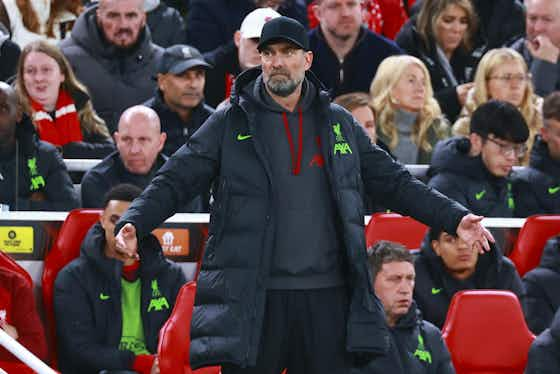Anfield Index
·12 May 2024
Jurgen Klopp’s Early Kick-Off Problems: Who’s to Blame?

Anfield Index
·12 May 2024

In the dynamic world of sports broadcasting, the recent developments in TV rights distribution have sparked a lot of debates. A thought-provoking piece by Mike Darcey on LinkedIn delves into the intricacies of this issue, focusing on Jurgen Klopp’s criticism of match scheduling and the broader implications of TV rights negotiations.
Jurgen Klopp, the animated Liverpool manager, has voiced his dissatisfaction with the scheduling of his team’s matches, particularly pointing fingers at TNT for their early Saturday game placements. However, Darcey argues convincingly that Klopp might be targeting the wrong adversary. “Broadcasters do not call the shots here. The PL designs the packs of rights, broadcasters bid for what is offered,” Darcey explains. This statement sheds light on the actual structure of decision-making, which primarily lies with the Premier League itself and not the broadcasting channels.
The Premier League packages and sells these slots to broadcasters who, having paid handsomely — TNT shells out £325 million annually — have limited flexibility. They merely utilize the slots purchased, making Klopp’s blame slightly misplaced. Darcey suggests a recalibration of expectations: “Don’t like it? Fine, change the rules, but expect and accept less revenue.” This reveals a trade-off between scheduling convenience and revenue maximization that clubs and their management need to balance.

Photo: IMAGO
Darcey doesn’t stop at Klopp’s grievances but also highlights the upcoming changes in Premier League contracts which will see live games increase from 200 to 270. This adjustment means fewer traditional 3 PM games on Saturdays, pushing more games to varied time slots, a move aimed at increasing revenue but complicating schedules for teams like Liverpool, especially those also competing in the Champions League.
The blog also dives into the American sports scene, particularly the NBA’s TV rights speculations. Darcey notes, “Nothing official yet, but ESPN is said to be renewing, with a further ‘streaming pack’ heading to Amazon.” The inclusion of Amazon and possibly other streaming giants like Netflix or Apple introduces new dynamics into the sports broadcasting landscape. This shift could potentially extend Amazon’s sports coverage significantly, pairing it with their NFL offerings and altering how sports are consumed globally.
The competitive tension between Comcast and Warner Bros. Discovery (WBD) over NBA rights underscores the fierce battle in sports media. Darcey outlines the stakes: “This is an existential risk for WBD, beyond TNT affiliate fees.” The potential shift of NBA rights to NBC could bolster Peacock’s portfolio while significantly impacting WBD’s strategy and market position.
Lastly, Darcey addresses the broader economic context, particularly Disney’s shift towards streaming profitability. While celebrating Disney’s positive financial results, he remains cautious about the sustainability and long-term profitability of the streaming model compared to traditional TV and content licensing revenues.
In conclusion, Mike Darcey’s article provides invaluable insights into the complex interplay of sports scheduling, TV rights, and the evolving landscape of media consumption. As the broadcasting world navigates these tumultuous waters, stakeholders at all levels — from league organizers to broadcasters and teams — must adapt strategically to the changing paradigms of sports media.


Live





























































